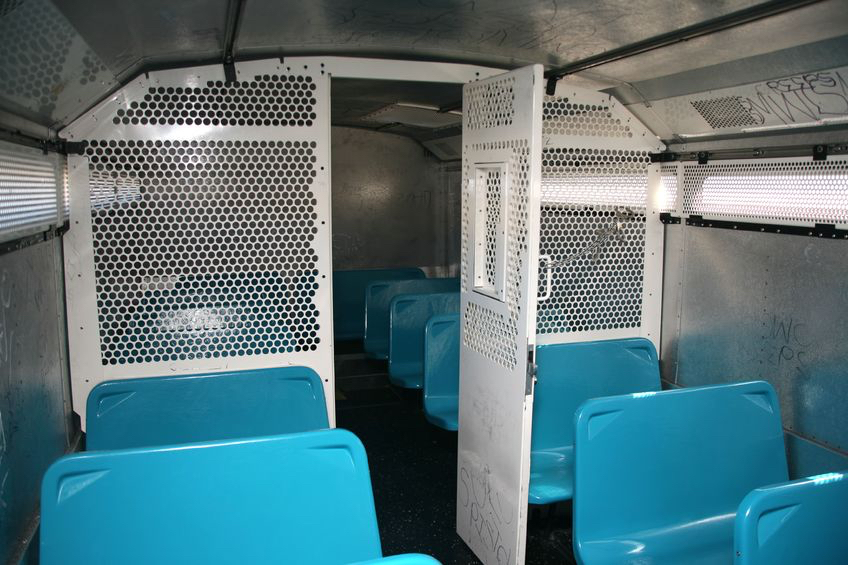Steps Michigan can take to make prisoner transportation more secure
The Michigan Department of Corrections’ contract with Prisoner Transportation Services of America, or PTS, says security officers in the vehicles, commonly known as agents, can carry weapons though they are not law enforcement officers. The agents also must must meet other criteria, including:
- Criminal background checks and drug testing
- Training in first aid and cardiopulmonary resuscitation
- Training in the use of restraints such as handcuffs and leg irons
- Pass weapons qualifications
- Possess a valid driver’s license or chauffeur’s license depending on the size of the vehicle
- Sign an initial conflict-of-interest form on whether they know or are related to any Michigan offender
- Private transport companies also must hire trained female personnel to transport female prisoners.
More coverage: State sheds little light on troubled prison transport firm
Quality controls
In Michigan, prisoner transportation companies are required to set standards for the care and safety of prisoners and the public. But how companies meet those standards is generally left to each vendor’s discretion. State prison officials refuse to share how these standards are met or enforced. The standards relate to:
- lodging prisoners in the event of inclement weather or breakdown of vehicles
- misconduct on the part of offenders
- the provision of food during transport
- lodging at local jails, as needed, during transport
- humane treatment of prisoners
In the event of delays from bad weather or vehicle breakdowns, the company must bear all costs including food and lodging costs of the contractor’s personnel and prisoners/offenders.
The company also must provide three meals every 24 hours for prisoners – at the company’s expense - during transport. Each meal must satisfy the nutritional and caloric recommendations approved by the National Research Council. The MDOC caloric requirements are 2,600 calories for males and 2,200 calories for females per day. The MDOC contract says that fast food meals are acceptable.
The state pays for all medical costs, including pharmaceuticals for prisoners and the cost of transportation to or from any medical facility.
What’s not regulated
The MDOC manual and the MDOC contract with its prison transport provider require that any vehicle transporting prisoners be equipped with restroom facilities or the vehicle “may make unscheduled stops” for “authorized bathroom breaks.”
But the rules do not specifically say how often the vehicles need to stop for bathroom breaks or which types of public facilities are acceptable for stops. Critics and prisoners have complained that prisoners are often forced to go without sanitary napkins or to urinate or defecate on themselves because agents, driven by a profit motive to move more prisoners in less time, do not want to stop.
More oversight urged
The Human Rights Defense Center, a Florida-based nonprofit prisoner rights advocacy group, has investigated violations by and lawsuits against private prisoner transport companies. Alex Friedmann, managing editor for its publication, Prison Legal News, suggests the federal government and states make the following changes when dealing with private vendors:
- Require companies to take out higher minimum insurance amounts
- Restrict the use of certain vehicles. For instance, banning 15-passenger vans which are linked to more accidents
- Specific rules governing maintenance and inspection of prisoner transport vehicles
- Mandatory seatbelt or other safety restraint requirements
- Increased civil penalties for regulatory violations that take into consideration a company's size or annual revenue
- A federal law requiring that all escapes, accidents and other incidents that endanger public safety during extraditions be reported to a central government agency, such as the Federal Motor Carrier Safety Administration, and made available to the public
- Requiring government contracts with private companies to incentivize physical safety and security, with financial penalties for violations
See what new members are saying about why they donated to Bridge Michigan:
- “In order for this information to be accurate and unbiased it must be underwritten by its readers, not by special interests.” - Larry S.
- “Not many other media sources report on the topics Bridge does.” - Susan B.
- “Your journalism is outstanding and rare these days.” - Mark S.
If you want to ensure the future of nonpartisan, nonprofit Michigan journalism, please become a member today. You, too, will be asked why you donated and maybe we'll feature your quote next time!


 The Michigan Department of Corrections won’t tell the public what steps it takes to ensure that a private, for-profit company it contracts with protects the safety of prisoners, guards and the public when transporting prisoners from other states.
The Michigan Department of Corrections won’t tell the public what steps it takes to ensure that a private, for-profit company it contracts with protects the safety of prisoners, guards and the public when transporting prisoners from other states.